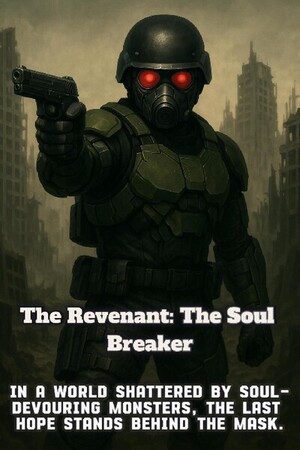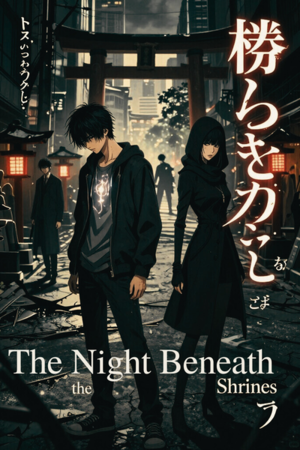Chapter 17:
Chapter 17 — A Voice Over Ruins
The Revenant: The Soul Breaker
The summit hall smelled of old paper and fresher fear. Flags that once meant sovereign pride hung limp. Around the long table sat the world’s surviving leaders — generals with hollow eyes, ministers in patched uniforms, delegates whose hands trembled on documents that seemed to matter less and less. Murmurs rose like a tide: worry, accusation, the old politics clawing at the edge of something that needed a new shape.
Kohaku stood at the center, still wearing his mask and helmet. He had listened to hours of speeches that boiled down to the same two things: distrust, and the demand to remove what they could not understand. As delegates argued, as old grudges surfaced as if the apocalypse had been merely a pause in the same selfish play, something inside the masked man snapped.
Then, for the first time since anyone could remember, Kohaku bared his raw, human voice and he did not whisper.
“SILENCE, ALL OF YOU!”
The shout cut the room like an axe. Conversation, bickering, and scorn fell into an immediate hush. The effect was total: all eyes swung toward him. The leaders were struck silent in a way that no command or protocol could pull off.
Kohaku let the silence sit for a moment, tasting the attention. His voice was rough and enormous when he began again, but steadier now, forged by pain and purpose.
“Do you even remember what ‘humanity’ means? After the world burned, we sat here and debated borders, loyalties, paperwork — while people starved, while children hid in rubble. We let our laws crumble, yes. But worse than broken walls are broken hearts.”
He paced once, slow and deliberate, and the hall listened as if the spoken words were a kind of map.
“We have lost everything. Sometimes we have even lost ourselves. Cities fell, institutions collapsed. But the most dangerous ruin is the ruin inside us: the doubt, the greed, the refusal to trust. That is the real contagion.”
Kohaku’s hands were quiet at his sides; his visor glowed faintly, but his tone was humanly urgent.
“Are we merely animals fighting over scraps? Or are we still worthy of the name ‘human’?”
He leaned forward, voice lowering so all leaned too.
“It will not be these broken stones that finish us. It will be the poison in our souls — suspicion and selfishness. We remember laughter without fear. We remember helping without asking for reward. That memory is not nostalgia; it is our blueprint.”
He straightened and his words became a rising tide that pushed back the old arguments.
“Unity does not mean erasing difference. Unity means choosing to stand on the same side — the side of humanity — even when we are different. Be a wall for your neighbor, not a blade.”
Kohaku swept his gaze across the room, slow and deliberate, and into the eyes of the weary delegates.
“Look around you. See the ruins and the ash. See the holes in the ground. This is the legacy of the apocalypse. The worst ruin is inside us. We survived storms and monsters. So why do we feel defeated? Because we let humanity fade. We hoarded. We distrusted. We chose quick cruelty over hard compassion. We have become worse than the storm.”
A tremor moved through the hall — not from fear of his voice this time, but from the truth of it.
“Ask yourselves: do you remember what it is to help without return? To share when your ration is small? Our only capital is unity. Alone, we are victims. Grouped without trust, we are predators to each other. But together — together with purpose and shared trust — we are a bulwark. Unity is not a choice. It is our blueprint. Our only way back to civilization.”
His words hit like a bell. For a long beat there was only the soft sound of breathing and the distant groan of ruined cityscapes beyond the hall.
Then voices broke out — not the leaders’ curt replies but the raw sound of people finally remembering. Survivors in the galleries began to clap, then to shout, then to chant in ragged, hopeful bursts.
“We will rebuild.”
“We will stand together.”
“No more walls between us!”
Soldiers rose from their chairs, boots scraping. One by one they stepped forward, not to oppose or to salute a banner, but to make a clearer decision. A murmur traveled through the ranks like wildfire: if the leaders would not step forward, the soldiers would step beyond rank. Men and women in uniform began to unfasten insignia, peel off badges, and throw them onto the table as if casting them into a fire.
“If you force hatred and division, we will cast away rank and stand with humanity!” someone shouted from the front row. It was not just bravado — faces were hard with resolve. A line of officers unclipped medals and laid them down. Soldiers by the door reached for their rifles and, to the astonishment of the room, offered to hand them over as a pledge that they would fight for the people, not for titles.
Rika stood rigid, eyes glossy with unshed tears. Eva’s golden gaze flicked between Kohaku and the rising tide of voices, admiration mixing with the recognition that power had shifted. Meiyun’s face remained unreadable, but when she nodded, even faintly, it held weight. Seo Hana, ever blunt, smacked her palm against the table and barked a terse command that recalibrated the discipline into a new channel: protect the civilians and the newly found demi-humans, no matter the cost.
Agnes watched with something like quiet approval. She had known the man behind the mask longer than most; she understood the fracture line he was trying to mend.
Kohaku did not smile. He simply looked around, taking in the faces — ragged, frightened, raw, but now moving toward something larger than themselves.
“Build with me. Not under flags or old pride — under the choice to be human.”
A roar rose from the assembled survivors and soldiers. The leaders, who had started the day with defensive speeches and closed doors, found themselves surrounded by a sworn public that hungered for a new world.
When the hall finally emptied, whatever remained of the old protocols lay trampled on the floor. Conversations had shifted from “what borders” to “how to protect the people,” from “who commands” to “who cares.”
Outside, a thousand voices carried the same cadence into the night: the world was not yet healed, but for the first time after so much loss it felt — dangerously, defiantly — like it could be.




Please sign in to leave a comment.